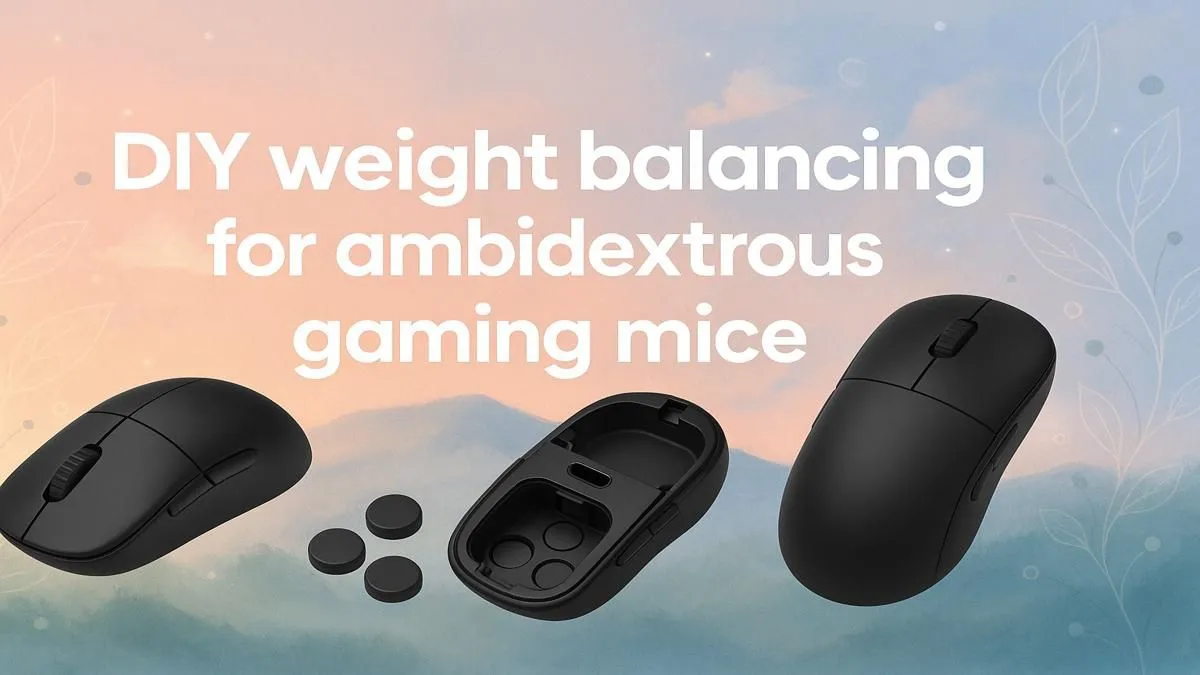
Arc A730M PCIe 4 Guide: Boost Your Data Performance
🚀 Boost your data processing with the Intel Arc A730M PCIe 4 graphics card. Learn efficiency secrets now!
Discover how to achieve the perfect weight balance for ambidextrous gaming mice. 🎮↘️ Customize your mouse for left or right-hand use easily.

You’re in a 1v3 clutch on Anubis. Your crosshair placement is perfect, your aim is snappy… but as you flick to the last target, your mouse feels just a bit… off. That tiny imbalance, a slight wobble during lift-off, costs you the round. For many South African gamers, perfecting your setup is key, and that includes your mouse. This guide explores the surprisingly simple world of DIY weight balancing for ambidextrous gaming mice. 🔧
Most gamers focus purely on the total weight of their mouse. Lighter is better, right? Not always. The balance is just as crucial, especially for symmetrical, ambidextrous designs. Since these mice aren't ergonomically shaped for a specific hand, their centre of gravity can feel unnatural depending on your grip style—claw, palm, or fingertip.
Properly balancing your mouse gives you a more stable, predictable aim. A front-heavy balance can prevent the cursor from drifting when you lift the mouse, while a back-heavy balance can anchor it more securely in your palm. It's a level of customisation that many of the gaming mice available don't offer out of the box, but it can make a massive difference to your in-game performance.
Ready to get your hands dirty? This process is easier than you think, but a word of caution: opening your mouse will almost certainly void its warranty. Proceed at your own risk!
First, identify where your mouse feels weakest. Place it on your mousepad and give it a few test flicks. Does the front lift too easily? Does the back feel too light for your palm grip? The goal of DIY weight balancing for your ambidextrous gaming mouse is to counteract these tendencies.
You don’t need anything fancy. Small, dense materials work best.
Carefully unscrew the base of your mouse (the screws are often hidden under the mouse feet). Once inside, you'll see empty pockets and spaces within the plastic shell. This is where you'll add your weights.
This kind of tactile optimisation can make even a simple mouse feel as responsive as a top-tier wireless mouse that costs hundreds of Rands more. ✨
Use double-sided tape or Blu-Tack to temporarily fix your weights in place. Reassemble the mouse and test its feel before making the placement permanent with a stronger adhesive. This lets you fine-tune the balance perfectly.
Is customising your mouse weight worth it? For tinkerers and competitive players seeking every possible edge, absolutely. The reward is a mouse that feels like a true extension of your hand. The risk, however, is real. You could damage an internal component or void your warranty, turning a R500 mouse into a paperweight.
For many, the reliability of a competition-grade wired mouse is a safer bet. Sometimes, simple upgrades to your existing setup, like new skates or grips from a range of mouse accessories, can provide a noticeable improvement without the risk. Ultimately, the choice is yours. 🚀
Find Your Perfect Balance at Evetech Ready to skip the DIY and find a mouse that feels perfect right out of the box? Check out our latest gaming mouse deals for pinpoint accuracy and performance that leaves the competition in the dust.
Customizing mouse weights for optimal comfort and performance.
Ensures equal comfort for both left and right-handed use.
Use adjustable kits or DIY materials like coins or putty.
Yes; balanced weight improves control and reduces fatigue.
Yes; many gaming mice allow weight adjustments.
Depends; balance suits different grips and styles.
Screwdriver, small weights, and patience for tuning.